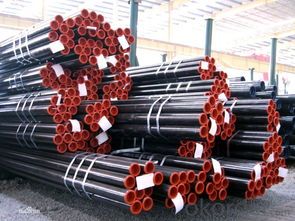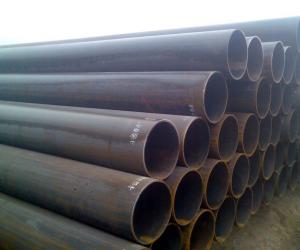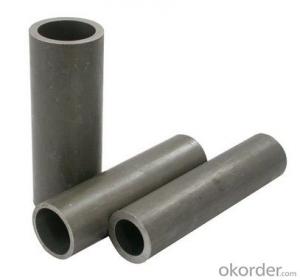Carbon Seamless Steel Pipe API 5L of 4 Inch Hot Sale Structuer Application
- Loading Port:
- Tianjin
- Payment Terms:
- TT or LC
- Min Order Qty:
- 25 m.t.
- Supply Capability:
- 10000 m.t./month
OKorder Service Pledge
OKorder Financial Service
You Might Also Like
1、Structure of Carbon Seamless Steel Pipe API 5L of 4 Inch:
Seamless pipe is formed by drawing a solid billet over a piercing rod to create the hollow shell.
As the manufacturing process does not include any welding, seamless pipes are perceived to be stronger and more reliable.
Historically seamless pipe was regarded as withstanding pressure better than other types, and was often more easily available than welded pipe.
2、Main Features of Carbon Seamless Steel Pipe API 5L of 4 Inch:
• High manufacturing accuracy
• High strength
• Small inertia resistance
• Strong heat dissipation ability
• Good visual effect
• Reasonable price
3、Carbon Seamless Steel Pipe API 5L of 4 Inch Images :

4、Packaging & Delivery
Packaging Details: | seaworthy package,bundles wrapped with strong steel strip |
Delivery Detail: | 15-30days after received 30%TT |
5、Carbon Seamless Steel Pipe API 5L of 4 Inch Hot Sale Structuer Application Specification:
Standard | GB, DIN, ASTM |
Grade | 10#-45#, 16Mn |
Thickness | 8 - 33 mm |
Section Shape | Round |
Outer Diameter | 133 - 219 mm |
Place of Origin | Shandong, China (Mainland) |
Secondary Or Not | Non-secondary |
Application | Hydraulic Pipe |
Technique | Cold Drawn |
Certification | API |
Surface Treatment | factory state or painted black |
Special Pipe | API Pipe |
Alloy Or Not | Non-alloy |
Length | 5-12M |
Outer Diameter | 21.3-610mm |
Grade | 20#, 45#, Q345, API J55, API K55, API L80, API N80, API P110, A53B |
Standard | ASME, ASTM |
1.Material:20#(ASTM A 106/A53 GRB.API5LGRB,GB),45#,16Mn,10#.
2.Specification range:OD:21.3-610mm,WT:6-70mm,length:6-12m or according to the requirement of clients.
3.Excutive standards:GB,ASME API5L.ASTM A 106/A53,Despite of the above standards,we can also supply seamless steel pipe with standard of DIN,JIS,and so on,and also develop new products according to the requirements of our clients!
4.Surface:black lacquered,varnish coating or galvanized.
5.Ends:Beveled or square cut,plastic capped,painted.
6.Packing:bundles wrapped with strong steel strip,seaworthy packing.
5、FAQ of Carbon Seamless Steel Pipe API 5L of 4 Inch Hot Sale Structuer Application:
①How is the quality of your products?
Our products are manufactured strictly according to national and internaional standard, and we take a test
on every pipe before delivered out. If you want see our quality certifications and all kinds of testing report, please just ask us for it.
Guaranteed: If products’ quality don’t accord to discription as we give or the promise before you place order, we promise 100% refund.
②How about price?
Yes, we are factory and be able to give you lowest price below market one, and we have a policy that “ for saving time and absolutely honest business attitude, we quote as lowest as possible for any customer, and discount can be given according to quantity”,if you like bargain and factory price is not low enough as you think, just don’t waste your time.Please trust the quotation we would give you, it is professional one.
Any question, pls feel free to contact us !
- Q:Are steel pipes suitable for use in sewage treatment plants?
- Yes, steel pipes are suitable for use in sewage treatment plants. They are durable, strong, and resistant to corrosion, making them ideal for handling the harsh environment and corrosive substances found in sewage treatment plants. Steel pipes also offer excellent flow characteristics and can withstand high pressure, making them reliable for transporting wastewater and sewage within the facility.
- Q:What are the different types of steel pipe coatings for underground applications?
- There are several types of steel pipe coatings used for underground applications, including fusion bonded epoxy (FBE), coal tar enamel (CTE), polyethylene (PE), and polyurethane (PU). These coatings provide corrosion protection and increase the lifespan of the steel pipes in underground environments.
- Q:Can steel pipes be coated for aesthetic purposes?
- Yes, steel pipes can be coated for aesthetic purposes. Coating steel pipes not only adds a visually appealing finish but also provides protection against corrosion and other environmental factors. There are various coating options available for steel pipes, such as powder coating, epoxy coating, and vinyl coating, among others. These coatings can be applied in different colors and textures to enhance the appearance of the pipes and complement the surrounding environment. Whether in industrial settings, architectural projects, or decorative applications, coating steel pipes can transform them into visually appealing elements while maintaining their structural integrity.
- Q:What are the uses of welded steel pipes?
- Low pressure fluid conveying galvanized steel tube (GB/T3091-1993) is also called galvanized pipe, commonly known as white tube. It is used for hot water, gas, air, oil, heating, steam, warm water and other generally low pressure fluid or other hot dip galvanizing (furnace welding or welding) steel pipe. The wall thickness of the steel pipe is divided into ordinary galvanized steel pipe and thick galvanized steel pipe. The end of the pipe is divided into non - threaded galvanized steel pipe and threaded galvanized steel pipe. The specification of steel pipe is expressed by nominal caliber (mm). The nominal diameter is the approximate value of the inner diameter. Usually used in inches, such as 11/2.
- Q:What is the role of steel pipes in the transportation of liquefied natural gas (LNG)?
- Due to their unique properties and characteristics, steel pipes are essential in the transportation of liquefied natural gas (LNG). LNG is a form of natural gas that is cooled to a liquid state for easier transportation and storage. Specific infrastructure is required for the transportation of LNG, and steel pipes are a crucial part of this infrastructure. To begin with, steel pipes are used in the construction of LNG terminals and liquefaction plants. These facilities are responsible for converting natural gas into its liquid form and storing it prior to transportation. The extremely cold temperatures needed to maintain LNG in its liquid state necessitate the use of materials that can withstand these conditions, and steel pipes are well-suited for this purpose. Steel pipes possess excellent strength and durability, enabling them to handle the low temperatures and high pressures involved in the liquefaction and storage processes. Additionally, steel pipes are employed in the transportation of LNG from the liquefaction plants to the storage tanks or shipping vessels. LNG is typically transported over long distances, either through pipelines or specialized LNG carriers. Steel pipes are utilized in the construction of underground or above-ground pipelines, providing a reliable and safe means of transporting the LNG. The pipes must be capable of maintaining the low temperatures of the LNG while enduring the pressures and stresses associated with the transportation process. Steel pipes offer the necessary strength, corrosion resistance, and thermal properties to ensure the safe and efficient transportation of LNG. Finally, steel pipes are also utilized in the construction of storage tanks for LNG. These tanks are designed to keep the LNG in its liquid state until it is ready for use or further transportation. The tanks are often constructed using a combination of steel plates and steel pipes. Steel pipes are employed to connect the various components of the tank, such as the inner and outer shells, reinforcing the structural integrity of the tank and guaranteeing its ability to withstand the extreme conditions to which it is exposed. In conclusion, steel pipes are vital in the transportation of liquefied natural gas (LNG) due to their strength, durability, and ability to endure low temperatures and high pressures. From the construction of LNG terminals and liquefaction plants to transportation through pipelines or specialized vessels, steel pipes are a crucial component of the infrastructure required for the safe and efficient transportation and storage of LNG.
- Q:Can steel pipes be used for oil and gas well production?
- Yes, steel pipes are commonly used for oil and gas well production due to their high strength, durability, and resistance to corrosion.
- Q:What's the gate number of the precision steel pipe?
- This kind of steel tube and ordinary hot-rolled seamless steel pipe and cold drawn seamless steel tube in the outer surface is different from the outer surface, and the diameter of the smooth finish of precision steel tube, stainless steel color and the same, inside and outside surface due to manufacturing reasons with a layer of oil.
- Q:How do steel pipes resist corrosion?
- Steel pipes resist corrosion through a process called passivation, where a protective layer of chromium oxide forms on the surface of the steel, preventing direct contact with corrosive elements and slowing down the oxidation process. Additionally, steel pipes can be coated with protective layers such as zinc or epoxy to provide an extra barrier against corrosion.
- Q:Can the KBG25 steel tube hold 4 six types of cables?
- Over five types of cables, the outer cross section is about 24 square millimeters, over six types of network cable for the outer cross section of about 35 square millimeters, so 35*4/490=28.57%, far more than 20%. Therefore, according to the norm, only 3 super six categories can be worn. If the distance is short and the joint is not enough, it can be laid like this, but it does not conform to the construction standard
- Q:How are steel pipes used in natural gas processing plants?
- Steel pipes are used in natural gas processing plants to transport and distribute natural gas from one point to another within the facility. These pipes are capable of withstanding high pressure and temperature, ensuring the safe and efficient flow of the gas throughout the plant. Additionally, steel pipes are resistant to corrosion, which is crucial as natural gas can be corrosive. They are also used for connecting various equipment and components in the processing plant, allowing for the smooth operation of the entire system.
1. Manufacturer Overview |
|
|---|---|
| Location | |
| Year Established | |
| Annual Output Value | |
| Main Markets | |
| Company Certifications | |
2. Manufacturer Certificates |
|
|---|---|
| a) Certification Name | |
| Range | |
| Reference | |
| Validity Period | |
3. Manufacturer Capability |
|
|---|---|
| a)Trade Capacity | |
| Nearest Port | |
| Export Percentage | |
| No.of Employees in Trade Department | |
| Language Spoken: | |
| b)Factory Information | |
| Factory Size: | |
| No. of Production Lines | |
| Contract Manufacturing | |
| Product Price Range | |
Send your message to us
Carbon Seamless Steel Pipe API 5L of 4 Inch Hot Sale Structuer Application
- Loading Port:
- Tianjin
- Payment Terms:
- TT or LC
- Min Order Qty:
- 25 m.t.
- Supply Capability:
- 10000 m.t./month
OKorder Service Pledge
OKorder Financial Service
Similar products
New products
Hot products
Hot Searches
Related keywords






























